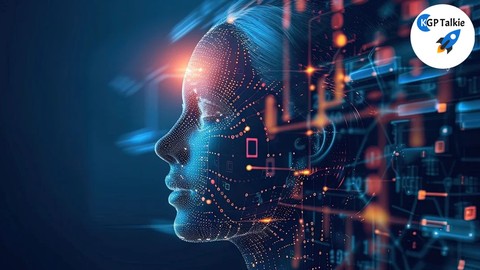
2024 Fine Tuning LLM with Hugging Face Transformers for NLP
2024 Fine Tuning LLM with Hugging Face Transformers for NLP, available at $54.99, has an average rating of 4.77, with 141 lectures, based on 55 reviews, and has 442 subscribers.
You will learn about Understand transformers and their role in NLP. Gain hands-on experience with Hugging Face Transformers. Learn about relevant datasets and evaluation metrics. Fine-tune transformers for text classification, question answering, natural language inference, text summarization, and machine translation. Understand the principles of transformer fine-tuning. Apply transformer fine-tuning to real-world NLP problems. Learn about different types of transformers, such as BERT, GPT-2, and T5. Hands-on experience with the Hugging Face Transformers library This course is ideal for individuals who are NLP practitioners: This course is designed for NLP practitioners who want to learn how to fine-tune pre-trained transformer models to achieve state-of-the-art results on a variety of NLP tasks. or Researchers: This course is also designed for researchers who are interested in exploring the potential of transformer fine-tuning for new NLP applications. or Students: This course is suitable for students who have taken an introductory NLP course and want to deepen their understanding of transformer models and their application to real-world NLP problems. or Developers: This course is beneficial for developers who want to incorporate transformer fine-tuning into their NLP applications. or Hobbyists: This course is accessible to hobbyists who are interested in learning about transformer fine-tuning and applying it to personal projects. It is particularly useful for NLP practitioners: This course is designed for NLP practitioners who want to learn how to fine-tune pre-trained transformer models to achieve state-of-the-art results on a variety of NLP tasks. or Researchers: This course is also designed for researchers who are interested in exploring the potential of transformer fine-tuning for new NLP applications. or Students: This course is suitable for students who have taken an introductory NLP course and want to deepen their understanding of transformer models and their application to real-world NLP problems. or Developers: This course is beneficial for developers who want to incorporate transformer fine-tuning into their NLP applications. or Hobbyists: This course is accessible to hobbyists who are interested in learning about transformer fine-tuning and applying it to personal projects.
Enroll now: 2024 Fine Tuning LLM with Hugging Face Transformers for NLP
Summary
Title: 2024 Fine Tuning LLM with Hugging Face Transformers for NLP
Price: $54.99
Average Rating: 4.77
Number of Lectures: 141
Number of Published Lectures: 141
Number of Curriculum Items: 141
Number of Published Curriculum Objects: 141
Original Price: $199.99
Quality Status: approved
Status: Live
What You Will Learn
- Understand transformers and their role in NLP.
- Gain hands-on experience with Hugging Face Transformers.
- Learn about relevant datasets and evaluation metrics.
- Fine-tune transformers for text classification, question answering, natural language inference, text summarization, and machine translation.
- Understand the principles of transformer fine-tuning.
- Apply transformer fine-tuning to real-world NLP problems.
- Learn about different types of transformers, such as BERT, GPT-2, and T5.
- Hands-on experience with the Hugging Face Transformers library
Who Should Attend
- NLP practitioners: This course is designed for NLP practitioners who want to learn how to fine-tune pre-trained transformer models to achieve state-of-the-art results on a variety of NLP tasks.
- Researchers: This course is also designed for researchers who are interested in exploring the potential of transformer fine-tuning for new NLP applications.
- Students: This course is suitable for students who have taken an introductory NLP course and want to deepen their understanding of transformer models and their application to real-world NLP problems.
- Developers: This course is beneficial for developers who want to incorporate transformer fine-tuning into their NLP applications.
- Hobbyists: This course is accessible to hobbyists who are interested in learning about transformer fine-tuning and applying it to personal projects.
Target Audiences
- NLP practitioners: This course is designed for NLP practitioners who want to learn how to fine-tune pre-trained transformer models to achieve state-of-the-art results on a variety of NLP tasks.
- Researchers: This course is also designed for researchers who are interested in exploring the potential of transformer fine-tuning for new NLP applications.
- Students: This course is suitable for students who have taken an introductory NLP course and want to deepen their understanding of transformer models and their application to real-world NLP problems.
- Developers: This course is beneficial for developers who want to incorporate transformer fine-tuning into their NLP applications.
- Hobbyists: This course is accessible to hobbyists who are interested in learning about transformer fine-tuning and applying it to personal projects.
Do not take this course if you are an ML beginner.This course is designed for those who are interested in pure coding and want to fine-tune LLMs instead of focusing on prompt engineering. Otherwise, you may find it difficult to understand.
Welcome to “Mastering Transformer Models and LLM Fine Tuning”, a comprehensive and practical course designed for all levels, from beginners to advanced practitioners in Natural Language Processing (NLP). This course delves deep into the world of Transformer models, fine-tuning techniques, and knowledge distillation, with a special focus on popular BERT variants like Phi2, LLAMA, T5, BERT, DistilBERT, MobileBERT, and TinyBERT.
Course Overview:
Section 1: Introduction
-
Get an overview of the course and understand the learning outcomes.
-
Introduction to the resources and code files you will need throughout the course.
Section 2: Understanding Transformers with Hugging Face
-
Learn the fundamentals of Hugging Face Transformers.
-
Explore Hugging Face pipelines, checkpoints, models, and datasets.
-
Gain insights into Hugging Face Spaces and Auto-Classes for seamless model management.
Section 3: Core Concepts of Transformers and LLMs
-
Delve into the architectures and key concepts behind Transformers.
-
Understand the applications of Transformers in various NLP tasks.
-
Introduction to transfer learning with Transformers.
Section 4: BERT Architecture Deep Dive
-
Detailed exploration of BERT’s architecture and its importance in context understanding.
-
Learn about Masked Language Modeling (MLM) and Next Sentence Prediction (NSP) in BERT.
-
Understand BERT fine-tuning and evaluation techniques.
Section 5: Practical Fine-Tuning with BERT
-
Hands-on sessions to fine-tune BERT for sentiment classification on Twitter data.
-
Step-by-step guide on data loading, tokenization, and model training.
-
Practical application of fine-tuning techniques to build a BERT classifier.
Section 6: Knowledge Distillation Techniques for BERT
-
Introduction to knowledge distillation and its significance in model optimization.
-
Detailed study of DistilBERT, including loss functions and paper walkthroughs.
-
Explore MobileBERT and TinyBERT, with a focus on their unique distillation techniques and practical implementations.
Section 7: Applying Distilled BERT Models for Real-World Tasks like Fake News Detection
-
Use DistilBERT, MobileBERT, and TinyBERT for fake news detection.
-
Practical examples and hands-on exercises to build and evaluate models.
-
Benchmarking performance of distilled models against BERT-Base.
Section 8: Named Entity Recognition (NER) with DistilBERT
-
Techniques for fine-tuning DistilBERT for NER in restaurant search applications.
-
Detailed guide on data preparation, tokenization, and model training.
-
Hands-on sessions to build, evaluate, and deploy NER models.
Section 9: Custom Summarization with T5 Transformer
-
Practical guide to fine-tuning the T5 model for summarization tasks.
-
Detailed walkthrough of dataset analysis, tokenization, and model fine-tuning.
-
Implement summarization predictions on custom data.
Section 10: Vision Transformer for Image Classification
-
Introduction to Vision Transformers (ViT) and their applications.
-
Step-by-step guide to using ViT for classifying Indian foods.
-
Practical exercises on image preprocessing, model training, and evaluation.
Section 11: Fine-Tuning Large Language Models on Custom Datasets
-
Theoretical insights and practical steps for fine-tuning large language models (LLMs).
-
Explore various fine-tuning techniques, including PEFT, LORA, and QLORA.
-
Hands-on coding sessions to implement custom dataset fine-tuning for LLMs.
Section 12: Specialized Topics in Transformer Fine-Tuning
-
Learn about advanced topics such as 8-bit quantization and adapter-based fine-tuning.
-
Review and implement state-of-the-art techniques for optimizing Transformer models.
-
Practical sessions to generate product descriptions using fine-tuned models.
Section 13: Building Chat and Instruction Models with LLAMA
-
Learn about advanced topics such as 4-bit quantization and adapter-based fine-tuning.
-
Techniques for fine-tuning the LLAMA base model for chat and instruction-based tasks.
-
Practical examples and hands-on guidance to build, train, and deploy chat models.
-
Explore the significance of chat format datasets and model configuration for PEFT fine-tuning.
Enroll now in “Mastering Transformer Models and LLM Fine Tuning on Custom Dataset” and gain the skills to harness the power of state-of-the-art NLP models. Whether you’re just starting or looking to enhance your expertise, this course offers valuable knowledge and practical experience to elevate your proficiency in the field of natural language processing.
Unlock the full potential of Transformer models with our comprehensive course. Master fine-tuning techniques for BERT variants, explore knowledge distillation with DistilBERT, MobileBERT, and TinyBERT, and apply advanced models like RoBERTa, ALBERT, XLNet, and Vision Transformers for real-world NLP applications. Dive into practical examples using Hugging Face tools, T5 for summarization, and learn to build custom chat models with LLAMA.
Keywords: Transformer models, fine-tuning BERT, DistilBERT, MobileBERT, TinyBERT, RoBERTa, ALBERT, XLNet, ELECTRA, ConvBERT, DeBERTa, Vision Transformer, T5, BART, Pegasus, GPT-3, DeiT, Swin Transformer, Hugging Face, NLP applications, knowledge distillation, custom chat models, LLAMA.
Course Curriculum
Chapter 1: Introduction
Lecture 1: Course Introduction
Lecture 2: Code File [Resources]
Chapter 2: Hello Transformers
Lecture 1: Introduction
Lecture 2: Introduction to Hugging Face Transformers
Lecture 3: Introduction to HuggingFace Pipeline
Lecture 4: Introduction to Hugging Face Checkpoints, Models, Datasets
Lecture 5: Introduction to Hugging Face Spaces
Lecture 6: Introduction to Hugging Face Auto-Classes
Lecture 7: Introduction to Transfer Learning with Transformers
Lecture 8: Transformers Applications
Lecture 9: Classification Pipeline for Sentiment and Emotions Prediction
Lecture 10: NER Pipeline Explained
Lecture 11: Question Answer Pipeline
Lecture 12: Summarization Pipeline
Lecture 13: Text Generation Pipeline
Lecture 14: Translation Pipeline
Lecture 15: Image Classification for Emotions and Age of a Person Detection
Lecture 16: Image Segmentation for Clothing eCommerce Sites
Lecture 17: Text to Speech Conversion using Audio Pipeline
Lecture 18: Text to Music Generation using Facebook's musicgen
Chapter 3: Transformers Architectures and Basic LLM Concepts
Lecture 1: Introduction
Lecture 2: Seq2Seq Model Introduction Part 1
Lecture 3: Seq2Seq Model Introduction Part 2
Lecture 4: Overcoming from the Seq2Seq Issues
Lecture 5: How to Apply Attention in Seq2Seq Networks
Lecture 6: How to Calculate Q, K and V Vectors
Lecture 7: Scaled Dot Product Attention
Lecture 8: Transformers with Encoding and Decoding Stacks
Lecture 9: How Encoder Works in Transformers
Lecture 10: How Position Encoding is Calculated in Transformers
Lecture 11: Self-Attention, Masked Self Attention and Cross Attention Explained
Lecture 12: How Multi-Head Attention Network Works
Lecture 13: How Decoder Works
Lecture 14: Transformers Applications
Chapter 4: BERT Architecture Theory
Lecture 1: Introduction
Lecture 2: BERT Introduction
Lecture 3: What is importance of Right Context in BERT
Lecture 4: BERT Paper Terminology Understanding Part 1
Lecture 5: BERT Paper Terminology Understanding Part 2
Lecture 6: Going Deeper into BERT
Lecture 7: How Input is Processed into BERT
Lecture 8: How MLM and NSP is Performed
Lecture 9: How BERT Model Fine-Tuning and Evaluation were Done
Chapter 5: Fine-Tuning BERT for Multi-Class Sentiment Classification for Twitter Tweets
Lecture 1: Introduction
Lecture 2: BERT Classifier Introduction
Lecture 3: Twitter Tweets Loading
Lecture 4: Data Analysis
Lecture 5: How Tokenization is Done
Lecture 6: Data Loader and Train Test Split
Lecture 7: Tokenization of the Data
Lecture 8: Model Config Deep Dive
Lecture 9: Loading Model for Classification with Classifier Head
Lecture 10: Building Training Arguments
Lecture 11: Building Compute Metrics
Lecture 12: Build Trainer and Do Training
Lecture 13: Evaluate Model on Test Set
Lecture 14: Plot Confusion Matrix
Lecture 15: Save Model and Do Prediction on Custom Data
Lecture 16: Build Streamlit Application with Model for Prediction
Chapter 6: Knowledge Distillation for BERT – DistilBERT, MobileBERT and TinyBERT [Theory]
Lecture 1: Introduction
Lecture 2: Knowledge Distillation Introduction
Lecture 3: DistilBERT Loss Functions
Lecture 4: DistilBERT Paper Walkthrough Part 1
Lecture 5: DistilBERT Paper Walkthrough Part 2
Lecture 6: MobileBERT Introduction
Lecture 7: MobileBERT Parameter Settings
Lecture 8: MobileBERT Knowledge Distillation
Lecture 9: MobileBERT Paper Walkthrough Part 1
Lecture 10: MobileBERT Paper Walkthrough Part 2
Lecture 11: MobileBERT Paper Walkthrough Part 3
Lecture 12: TinyBERT Introduction
Lecture 13: TinyBERT Paper Walkthrough
Chapter 7: Fake News Detection using DistilBERT, MobileBERT and TinyBERT
Lecture 1: Introduction
Lecture 2: Fake News Data Loading
Lecture 3: Dataset Analysis
Lecture 4: Train Test Split Dataset Preparation
Lecture 5: Data Tokenization
Lecture 6: Model Building and Analysis for DistilBERT, MobileBERT and TinyBERT
Lecture 7: Model Training
Lecture 8: Model Evaluation
Lecture 9: Performance Benchmarking of DistilBERT, MobileBERT and TinyBERT with BERT-Base
Lecture 10: Performance Benchmarking of DistilBERT, MobileBERT and TinyBERT with BERT-Base
Chapter 8: Restaurant Search NER Recognition By Fine Tuning DistilBERT
Lecture 1: Introduction
Lecture 2: Introduction to NER
Lecture 3: What is BIO or IOB NER Tagging Format
Lecture 4: Loading Dataset Part 1
Lecture 5: Loading Dataset Part 2
Lecture 6: Load HuggingFace Dataset Part 1
Lecture 7: Load HuggingFace Dataset Part 2
Lecture 8: Model Building and Tokenization
Lecture 9: NER Labels Alignment with Tokens
Lecture 10: Make Sequence Evaluator for NER Tagging
Instructors
-
Laxmi Kant | KGP Talkie
AVP, Data Science Join Ventures | IIT Kharagpur | KGPTalkie
Rating Distribution
- 1 stars: 1 votes
- 2 stars: 1 votes
- 3 stars: 2 votes
- 4 stars: 5 votes
- 5 stars: 46 votes
Frequently Asked Questions
How long do I have access to the course materials?
You can view and review the lecture materials indefinitely, like an on-demand channel.
Can I take my courses with me wherever I go?
Definitely! If you have an internet connection, courses on Udemy are available on any device at any time. If you don’t have an internet connection, some instructors also let their students download course lectures. That’s up to the instructor though, so make sure you get on their good side!
You may also like
- Best Video Editing Courses to Learn in February 2025
- Best Music Production Courses to Learn in February 2025
- Best Animation Courses to Learn in February 2025
- Best Digital Illustration Courses to Learn in February 2025
- Best Renewable Energy Courses to Learn in February 2025
- Best Sustainable Living Courses to Learn in February 2025
- Best Ethical AI Courses to Learn in February 2025
- Best Cybersecurity Fundamentals Courses to Learn in February 2025
- Best Smart Home Technology Courses to Learn in February 2025
- Best Holistic Health Courses to Learn in February 2025
- Best Nutrition And Diet Planning Courses to Learn in February 2025
- Best Yoga Instruction Courses to Learn in February 2025
- Best Stress Management Courses to Learn in February 2025
- Best Mindfulness Meditation Courses to Learn in February 2025
- Best Life Coaching Courses to Learn in February 2025
- Best Career Development Courses to Learn in February 2025
- Best Relationship Building Courses to Learn in February 2025
- Best Parenting Skills Courses to Learn in February 2025
- Best Home Improvement Courses to Learn in February 2025
- Best Gardening Courses to Learn in February 2025






















